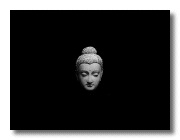
I hesitate to talk about meditation techniques, because there's an aspect of
our minds that just wants to get something to 'fix ourselves', so that we can
become how we want to be. But technique isn't going to fix us. If anything can
help us it is following our own thoroughly investigated inclination towards
the realisation of what really matters. From that understanding of ourselves
we can really want to meditate: not because some clever person or popular religion
or book said it was a good idea but because we want to be in the centre of our
life, present for every experience, moment by moment. Meditation is not about
preparing for the future with fearful manipulation, but about wanting to live
with presence. If we can feel the point of this, and happen to discover an inspiration
to meditate, we'll meditate successfully. But it has got to come from that sort
of motivation.
If we don't exercise our minds, then just as with a physical limb, atrophy sets
in. If you have had a broken leg and it's been in plaster for a month or two
you will know how, when they take off the cast, there's just a withered thing.
When you want to do something with it, it won't function. Even though your head
tells you this limb should do such and such, and you want to do it, it won't
do it through lack of exercise. Similarly, if we don't exercise the discipline
of attention that engages the limb of mindfulness, it atrophies.
Counting the breath is one basic, simple exercise that you can practice to cultivate
mindfulness. When I teach people to count the breath as a meditation technique,
I always try to encourage them to do it with a sense of humour, as a kind of
game, because the last thing we need is for meditation to become another aspect
of the compulsive part of ourselves. We count the out-breaths, from one up to
ten and back to one. It's fine to sit in a chair; you don't have to get all
'yogic' about it, although it's good if you can. We count, and get lost, and
begin again; we find all kinds of feelings arising which we just notice. We
can contemplate them: are these aspects of ourselves obligations, or are they
choices? Little by little, we'll see how much our preoccupation's are a matter
of choice. We have a choice, we can choose to follow or not to follow certain
ways. This is how we find our own centre. You'll be very pleased when that happens.
This is only one way of using the meditation on breath, and there are other
ways of doing it. But whichever mindfulness practice you take up, please remember
to be relaxed about it - otherwise you may compound things that don't need compounding.